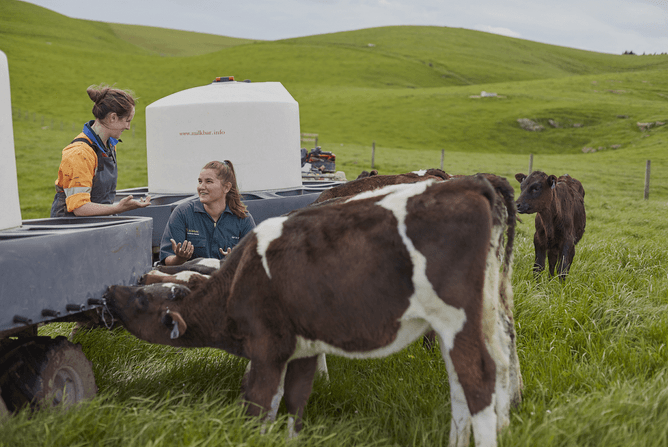We all know that when calf rearing, colostrum is worth its weight in gold. But why is colostrum so important?
Providing the right amount of good quality colostrum as early as possible to newborn calves is essential as colostrum is full of antibodies which the calf requires in the first 24 hours of its life. As they are born with no immune system, getting this colostrum early allows their gut to absorb all the good stuff. If you hear us talking about Failure of Passive Transfer, it is when the calf fails to get enough antibodies in this window.
DairyNZ state “Giving your newborn calves the correct amount of high-quality colostrum will help ensure:
- Less scours and disease
- Reduced death rates
- Better growth rates
- Improved lifetime productivity and fertility
Colostrum quality varies hugely, with the first milkings generally being the most antibody dense. To make sure we are getting the good stuff to our calves we can easily measure its antibody quality using a Brix Refractometer. It is a simple and inexpensive way to ensure your calves get the high-quality colostrum they require.
Newly calved cows have higher levels of antibodies in their milk, so milking them as soon after calving as possible is important for colostrum harvesting. The sooner it is collected, the higher the quality as cows start producing milk as soon as they calve and so start to dilute the concentration of the colostrum. Also bear in mind for calves to get the protection from scour vaccines given to the cows (eg rotavec) they need to have a feed of the colostrum that contains these antibodies.
You cannot tell the quality of colostrum from just how it looks, the only way to check how much antibody is present is by testing the colostrum. A Brix Refractometer will allow you to read the antibody content by dropping a sample of your colostrum onto the glass. Anything over 22% is good quality so putting that bucket aside for newly collected calves will help guarantee they are getting the liquid gold.
When focusing on colostrum feeding to calves, we often focus on the 4Qs of colostrum:
Quality: measuring is the only way to tell the quality of colostrum in terms of the amount of antibodies present, any colostrum above 22% on the Brix is good!
Quickly: every hour counts as the calves can only absorb antibodies within the first 24 hours of its life, and ideally the sooner the better!
Quantity: aim for 2-6L of colostrum within the first 12 hours (keep in mind a calf can only hold 1.5L of milk in its stomach so two feeds in 12 hours is best).
sssQueaky Clean: any feeding equipment and colostrum collection equipment needs to be sparkling clean. Remember that any bugs that you feed into the calf will be able to cause disease more easily in a newborn with a poorly developed immune system.
We have Brix Refractometers available at all our clinics, if you don’t have one as part of your calving kit, we recommend trying it this year and see your results!
The other way to help give you clues as to how your colostrum management is going is by asking the calves. Blood samples from calves between 2 and 7 days of age tested for total protein can give an indication of whether the calves have received enough colostrum at birth or not. This is a quick and easy test and can be performed in house. It won't change the fact that the calf hasn’t received her antibodies but it can help to inform management decisions around colostrum management and feeding and also build a picture of why some calves may be having more issues. Talk to your KeyVet team about sampling if you feel like this could help on your farm.
- Rachel Bragg

